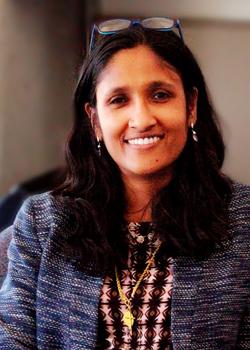
Shyni Varghese will join the faculty of Duke University’s engineering and medical schools in summer 2017. With a triple appointment in the Departments of Biomedical Engineering, Mechanical Engineering and Materials Science, and Orthopaedic Surgery, Varghese will be the first MEDx Investigator.
A new initiative of the Pratt School of Engineering and Duke School of Medicine, Duke MEDx seeks to enhance and form new collaborations between doctors and engineers. As its first faculty member with a joint appointment through the program, Varghese will demonstrate just how powerful such partnerships can become.
A leader in the field of biomaterials and stem cells, Varghese will continue to develop her research at Duke in three major areas—musculoskeletal tissue repair, disease biophysics and organ-on-a-chip technology.
“I am delighted that Dr. Varghese will be Duke’s first MEDx Investigator – a distinction that recognizes her strategic contribution at the interface of medicine and engineering with her work in innovative biomaterials and stem cells,” said Geoff Ginsburg, professor of medicine and director of MEDx. “She is a role model for MEDx and we expect her to be a catalyst for great interactions with students and faculty from both Pratt and the School of Medicine.”
One of the major hurdles to developing new pharmaceuticals and understanding diseases is the wide variety of responses they provoke in different tissues in the body. Using animal models is imperfect at best, and drug effects and disease symptoms can vary greatly from person to person.
To develop a better model, Varghese is working to simulate human tissues in lab-on-a-chip technologies and combine them into an integrated system that mimics the complex functions of the human body. Specifically, Varghese is focusing on musculoskeletal tissues and tumor-on-a-chip models.
“We’re trying to integrate these small-scale but very robust human-specific models to look at how immune cells can be recruited to a tumor site and to understand the role of the cellular environment on cancer spread and growth,” said Varghese, who joins Duke from the University of California – San Diego. “Mimicking skeletal muscle on a chip will also help us model many different muscle diseases ex vivo.”
In the same vein, Varghese’s second focus of study will be on developing strategies to promote musculoskeletal tissue repair. Besides using a stem cell and tissue engineering approach, Varghese’s laboratory has devised strategies to recruit and activate patient’s own cells to promote tissue repair and regeneration.
Her research has identified molecular pathways that has shown to reduce—and even reverse—the effects of osteoporosis in animal models. Varghese’s laboratory has also identified a new molecular player that contributes to skin fibrosis such as scleroderma. As the next step, her group is exploring new therapeutic strategies to treat skin fibrosis and scarring.
“I was drawn to this position because of its 50/50 split between the engineering school and the medical school. It seemed like a very natural fit,” said Varghese. “The position will give me easier access to my needs such as tissue samples. It will also allow me to learn firsthand about new problems clinicians are facing so that I can find solutions.”
“Shyni is a leading biomaterials scientist and will greatly strengthen this area of research at Duke,” said Ashutosh Chilkoti, professor and chair of the Department of Biomedical Engineering. “Her appointment across three departments will build intellectual bridges between Pratt and the School of Medicine, and is the harbinger, I hope, of other such collaborative hires between the two schools in the future.”
"Shyni has a unique research focus, one that crosses engineering and medical disciplines in a way that will ultimately result in the development of improved therapeutic approaches to musculoskeletal repair and regeneration,” echoed Benjamin Alman, professor and chair of the Department of Orthopaedic Surgery. “Her recruitment by multiple departments with the help of MEDx is a great example of how a cooperative approach can be used to bring exceptional faculty to Duke."
Varghese says that, besides the obvious collaborations her new position will enable, she is excited about the opportunity it will bring for taking her research from the laboratory to the bedside.
“I already know many people I want to begin collaborations with in the clinical arena, and I’ll be looking to develop new research programs in that direction,” said Varghese.
Besides the unique opportunity her new position affords, Varghese says she was attracted to Duke because of its students. Often recruited by various private research organizations, she says she was never really tempted to leave academia.
“I really wanted to be able to keep working with students. That’s one thing I will never be able to give up,” said Varghese, who puts an emphasis on recruiting and mentoring students from diverse and underrepresented backgrounds. “I love motivating them and keeping them excited and passionate about their work. Being able to influence undergraduate and graduate students as they develop their own research interests and independence is something I think is extremely valuable.”